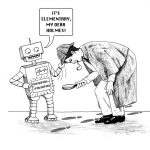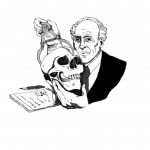This week the British book-review website Popular Science (not to be confused with the American magazine Popular Science) published an interview with me. The format consisted of four questions sent by e-mail, and I was allowed to make the answers as long or as short as I liked.
I enjoyed answering the questions and found them thought-provoking, so I am copying the interview below. If you like, you can of course read the interview on their web page by clicking here. Also, check out their (five-star!) review of The Universe in Zero Words by clicking here.
Why maths?
To me, mathematics is the most universal language. It is a subject with a continuous unbroken tradition from the ancient Chinese, Babylonians, and Egyptians to the present day – a longer tradition than any other science and virtually any other human endeavor. It is an enabling subject, in the sense that every other science depends on it to some extent, and generally speaking the more modern a science becomes, the more explicitly it incorporates mathematical reasoning and ideas.
Most importantly and most personally for me, I love mathematics because there is no other field I know of where truth and beauty are so closely intertwined. They are related in the other sciences as well, but I still feel that scientific truths are to some extent contingent and occasionally a result of happenstance. Our knowledge is based upon imperfect data and our imperfect interpretations thereof. In
mathematics, by contrast, nothing is ever true by accident. A mathematical theorem, once proven correctly, can never be falsified. (It can only become irrelevant, and even then it often returns to relevance when you least expect it.) The best theorems, and the best proofs, are almost always the ones with the greatest beauty and economy of ideas.
Why this book?
My purpose in writing this book is to demystify mathematics, and in particular to demystify equations.
For many people, an equation is a forbidding and scary thing. It looks like some kind of mystical incantation filled with secrets they are not privy to. And yet for scientists, and especially for mathematicians, it is exactly the opposite. Words are too imprecise and clumsy to express the fine details of a mathematical idea; an equation is often the only way to do it. This is why I called the book The Universe in Zero Words – because by opening yourself up to equations (which typically have zero words), you open yourself to seeing the universe more clearly.
To compare words to equations, imagine comparing a painting of Earth to a Google map. No matter how well executed, the painting is rough and inaccurate. When you zoom in on it, you don’t see any new geographic details. By contrast, the farther you zoom into a Google map, the more interesting details you see. It is the same way with an equation. This book is an attempt to help the reader through that process, to see the ”Google Maps” version of mathematics rather than the caricature version that popular culture presents us.
I also wrote this book because I wanted to write a mathematics book! My first book (The Big Splat, or How Our Moon Came to Be) was about a subject that I had no special training in when I began the project. It was a great way to exercise and develop my journalistic muscles. For my second book, I wanted to write about something that I already knew a lot about. This allowed me to write from a much more personal point of view, rather than the dispassionate view of the journalist or historian.
What’s next?
In the short term, I am continuing to write a series of booklets for the American Mathematical Society called What’s Happening in the Mathematical Sciences. The next one in the series, volume 9, should come out early next year, and I am very busy with that and hoping that I can meet my deadline.
In the long term, I expect that at some point I will get to work on another trade book. I love writing the “What’s Happening” series, but I have to admit that it reaches a rather narrow audience. At this point I can only describe the broadest features of what I am looking for in my next mass market book. Having written one book “far from home” (about planetary science) and one “close to home” (about mathematics) I will probably venture “farther from home” again. But I may change that plan if The Universe in Zero Words is a big success, and if there seems to be a big demand for another mathematical book from me. I would also be interested in writing a book that takes place over a shorter time frame, because both of my previous books covered nearly the whole period of recorded history. There is something to be said for the classical unities of time, space, and action (although I would not interpret them too literally).
What’s exciting you at the moment?
Mostly the things I have written about most recently and the things I am writing about right now. That would include an article I wrote for Science magazine about robotic flapping birds, and a chapter I wrote for What’s Happening in the Mathematical Sciences about mathematical algorithms to solve Rubik’s cube. An interesting thing that they had in common was that for the first time I found myself using YouTube as a research tool! There is an absolutely amazing video on YouTube of one of the new robotic birds, designed by a German company called Festo, flying over the audience at a TED conference in Edinburgh. You should look it up if you haven’t seen it. And there are many, many amazing videos on YouTube of “speedcubers” — people who solve Rubik’s cube as quickly as possible. Some use their hands, some use their feet, some do it blindfolded! The current world record for solving Rubik’s cube (by a human) is 5.66 seconds. I don’t know about you, but I can’t even unlock the door to my house in 5.66 seconds!



